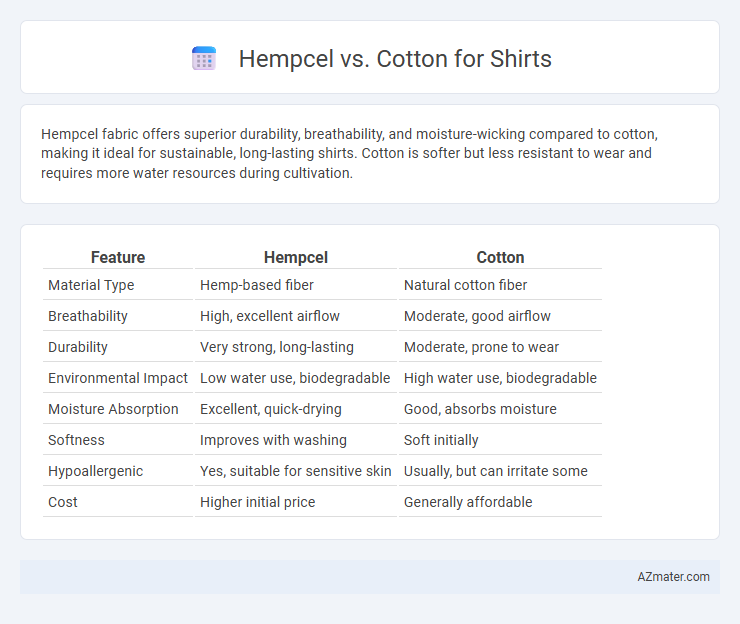Hempcel fabric offers superior durability, breathability, and moisture-wicking compared to cotton, making it ideal for sustainable, long-lasting shirts. Cotton is softer but less resistant to wear and requires more water resources during cultivation.
Table of Comparison
| Feature | Hempcel | Cotton |
|---|---|---|
| Material Type | Hemp-based fiber | Natural cotton fiber |
| Breathability | High, excellent airflow | Moderate, good airflow |
| Durability | Very strong, long-lasting | Moderate, prone to wear |
| Environmental Impact | Low water use, biodegradable | High water use, biodegradable |
| Moisture Absorption | Excellent, quick-drying | Good, absorbs moisture |
| Softness | Improves with washing | Soft initially |
| Hypoallergenic | Yes, suitable for sensitive skin | Usually, but can irritate some |
| Cost | Higher initial price | Generally affordable |
Introduction to Hempcel and Cotton
Hempcel fabric is derived from hemp fibers known for their durability, breathability, and natural antimicrobial properties, making it an eco-friendly textile option. Cotton, a widely used natural fiber, offers softness, moisture absorption, and comfort, dominating the shirt market due to its availability and versatility. Comparing Hempcel and cotton reveals differences in sustainability, texture, and performance that influence shirt quality and environmental impact.
Material Composition and Origins
Hempcel shirts are made from hemp fibers, known for their durability, breathability, and natural antimicrobial properties, sourced from industrial hemp plants primarily grown in Europe and North America. Cotton shirts consist of soft, natural fibers harvested from cotton plants, with major production regions including the United States, India, and China, offering comfort and moisture absorption. Hempcel's sustainable cultivation requires less water and pesticides compared to cotton, making it an eco-friendlier choice in material composition and sourcing.
Environmental Impact Comparison
Hempcel shirts have a significantly lower environmental impact compared to cotton, as hemp cultivation requires 50% less water and no pesticides, reducing soil degradation and water pollution. Cotton farming accounts for 20% of global pesticide use and contributes heavily to soil erosion, leading to diminished biodiversity. Hemp's rapid growth and ability to restore soil health make it a more sustainable choice for eco-friendly clothing production.
Durability and Longevity
Hempcel fabric offers superior durability compared to cotton due to its strong, long fibers that resist wear and tear over time, making shirts crafted from hempcel more long-lasting. Cotton, while softer, tends to break down faster with repeated washing and exposure to sunlight, leading to quicker fading and thinning. Choosing hempcel for shirts ensures enhanced longevity and sustained fabric integrity, ideal for consumers seeking durable, eco-friendly apparel.
Comfort and Breathability
Hempcel shirts outperform cotton in comfort due to their natural moisture-wicking and antibacterial properties, which keep skin dry and fresh throughout the day. The open weave structure of Hempcel fibers enhances breathability, allowing better airflow compared to dense cotton fabrics. Hempcel's durability and softness improve with each wash, providing long-lasting comfort that cotton shirts often lack.
Moisture-Wicking and Absorption
Hempcel fabric offers superior moisture-wicking properties compared to cotton, efficiently drawing sweat away from the skin to keep the wearer dry and comfortable. Its natural breathability and enhanced absorption capabilities allow quicker evaporation, making it ideal for activewear and hot climates. Cotton, while absorbent, retains moisture longer, often resulting in a damp feel, which can reduce comfort during prolonged physical activity.
Style and Aesthetic Differences
Hempcel shirts offer a unique, natural texture with a slightly rougher finish that adds rustic appeal and durability, making them ideal for eco-conscious fashion statements. Cotton shirts provide a smoother, softer feel with a wide range of colors and patterns, catering to classic and versatile aesthetics. Hempcel fabric ages gracefully, developing a worn-in look, while cotton maintains a consistent appearance, supporting different style preferences.
Cost and Affordability
Hempcel shirts generally cost more upfront than cotton shirts due to the specialized processing required for hemp fibers, but their durability often translates to longer-lasting wear and lower replacement frequency. Cotton remains more affordable initially, benefiting from widespread cultivation and established manufacturing infrastructure that supports mass production and lower retail prices. Consumers prioritizing long-term value might find hempcel shirts a cost-effective investment despite a higher initial price point.
Care and Maintenance
Hempcel shirts require minimal maintenance due to their natural resistance to mildew and UV rays, making them ideal for frequent washing without significant wear. Cotton shirts, while breathable and soft, often need gentle cycle washing and may shrink or lose shape if not properly cared for, demanding more careful handling. Both fabrics benefit from air drying to prolong longevity, but Hempcel's durability and odor-resistant properties offer a practical edge in everyday upkeep.
Which is Better for Shirts: Hempcel or Cotton?
Hempcel fibers offer superior durability, breathability, and moisture-wicking properties compared to traditional cotton, making them ideal for long-lasting, comfortable shirts. Cotton, known for its softness and widespread availability, tends to retain moisture and wear out faster than hempcel textiles. Choosing hempcel results in more sustainable, hypoallergenic shirts that maintain shape and comfort through extended use.

Infographic: Hempcel vs Cotton for Shirt
 azmater.com
azmater.com